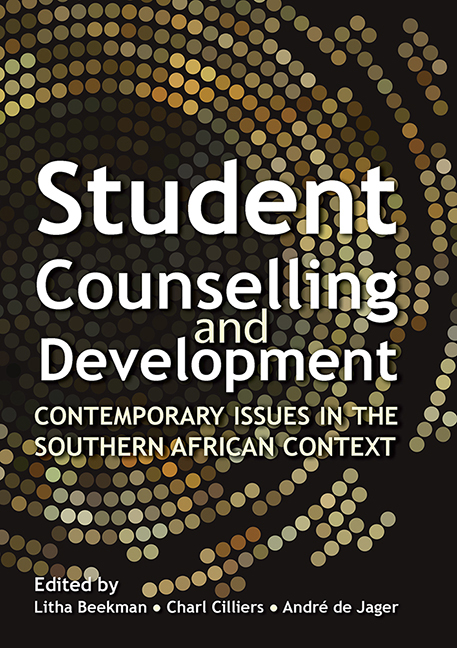 Student Counseling and Development in the South African Context
Student Counseling and Development in the South African Context Book contents
- Frontmatter
- Contents
- Figures
- Tables
- Preface
- Section 1 Development of Student Counselling and Development in Southern Africa
- Section 2 Theoretical Foundations of Student Counselling and Development in Higher Education
- Section 3 Services and Programmes Provided by Student Counselling and Development Units
- Section 4 Student Counselling and Development For Special Groups
- Section 5 Quality Assurance and Ethical and Professional Issues
- Contributors
- Index
Section 4 - Student Counselling and Development For Special Groups
Published online by Cambridge University Press: 22 February 2020
- Frontmatter
- Contents
- Figures
- Tables
- Preface
- Section 1 Development of Student Counselling and Development in Southern Africa
- Section 2 Theoretical Foundations of Student Counselling and Development in Higher Education
- Section 3 Services and Programmes Provided by Student Counselling and Development Units
- Section 4 Student Counselling and Development For Special Groups
- Section 5 Quality Assurance and Ethical and Professional Issues
- Contributors
- Index
Summary
The chapters in the previous sections lay the foundation for this section, where the focus is on some of the special groups of students at higher education (HE) institutions. All the groups and cohorts in the student profiles and compositions that have been mentioned in the chapters on career guidance and academic development have unique needs. It is, however, impossible to discuss all of them in this book.
Chapter 13 discusses the unique profile and challenges of student athletes. This group is important in South Africa because many students from disadvantaged communities only realise their sport talents once they are at HE institutions and receive bursaries from their second year onwards. These students have not been prepared in the way students from advantaged schools have been groomed throughout their school years. All student athletes have challenges with regard to balancing sport, academic, social and personal life and the need to both perform academically and in sport to maintain their status as bursary students.
Chapter 14 is an overview of open and distance learning (ODL) and the challenges it poses for student counsellors. Southern Africa has a limited number of residential higher education (HE) institutions with limited capacity. Many students have no other option than that of distance education because they do not qualify for admission to the limited space at residential institutions, are simply too poor to attend HE institutions in cities or do not have the finances to study full time. Student counsellors at ODL institutions for HE should take note of the paradigm shift and the opportunities created by technology to reinvent sCD services for the digital age and the different cohorts of students who enrol for oDL learning.
Chapter 15 discusses the SCD services rendered to students with disabilities and students who are disabled. The chapter provides an overview of the different approaches to services and specific services that can be rendered. student counsellors should strive to promote a universal system design where the sub-systems of the institution provide a true collaborative service to all students, regardless of functional limitations.
- Type
- Chapter
- Information
- Student Counseling and Development in the South African ContextContemporary issuesin the Southern African Context, pp. 245 - 246Publisher: University of South AfricaPrint publication year: 2012
